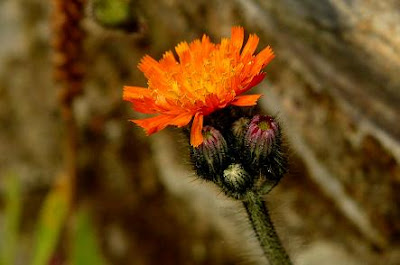This morning another (or the same) juvenile starling came this way. This time, its curiosity won over and it was soon down onto the shelving. here, it sat not only posing for a bit, but started to taste the bugs on the fading greenery around the shelves. young Starlings are grey, whereas the adult is the famous bird with its glamorous dark starry coat. When the juveniles moult into adult plumage, their bodies moult first, and this often gives them a clown-like appearance with their head remaining grey until their moulting is complete. This one has a funny appearance certainly, and it would confuse a lot of beginning birders, as to identifying the species.
Juvenile Starling, Stumus vulgaris



The Starlings might not be attracted to the food on offer, these visitors certainly are. I can hearthe shrill Zee of the Goldcrest, but I've not been able to locate it. Since the trees up front were topped very drastically, they and the Blue Tits moved away, searching for other conifers. So it would be great to see the returning to my humble garden.
Rook, Corvus frugilegus

Blue Tit, Parus caeruleus



Great Tit, Parus major

Fox and Cubs, Pilosella aurentiaca


Great series of photos.
ReplyDeleteThanks, John.
ReplyDeleteIt was quite relaxed, so a good chance for these pics.
love that blue tit pic
ReplyDeleteYour photos are brilliant - I especially love the Rook photo, they have such character!
ReplyDeleteThanks, Sharon;
ReplyDeleteYes, you are right about Rooks. And it is no wonder that many people keep these Birds as pet Birds.